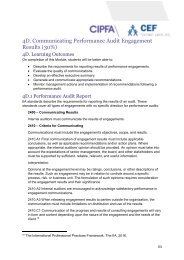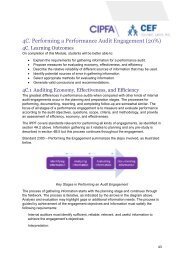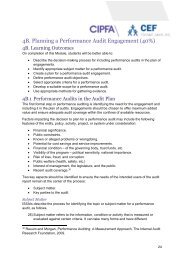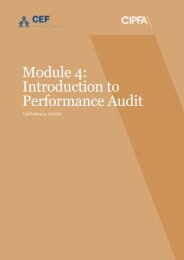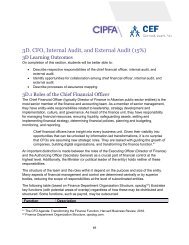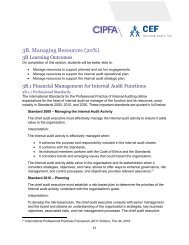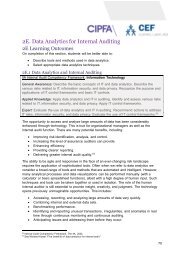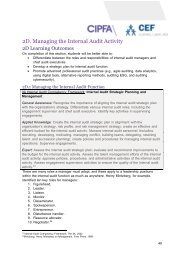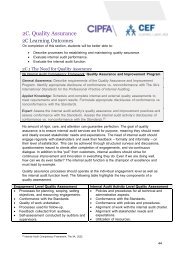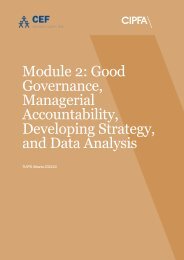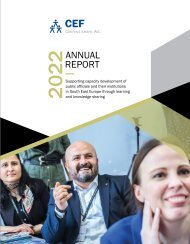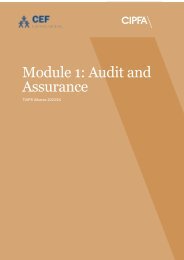CEF Annual report 2021
You also want an ePaper? Increase the reach of your titles
YUMPU automatically turns print PDFs into web optimized ePapers that Google loves.
92 <strong>CEF</strong> ANNUAL REPORT <strong>2021</strong><br />
APPENDIX 93<br />
IMF CAPACITY DEVELOPMENT SUPPORT TO SEE COUNTRIES IN <strong>2021</strong><br />
PUBLIC FINANCIAL MANAGEMENT<br />
CD Focus Areas CD Activities Examples of Outcomes<br />
REVENUE ADMINISTRATION<br />
CD Focus Areas CD Activities Examples of Outcomes<br />
Stronger PFM laws and<br />
Institutions, including<br />
PFM reform strategies<br />
Budget execution<br />
and controls are<br />
strengthened.<br />
Appraisal, selection<br />
and implementation of<br />
public investment are<br />
improved<br />
Cash and debt<br />
management are<br />
strengthened and better<br />
integrated<br />
Strengthened<br />
management of fiscal<br />
risk, particularly in<br />
light of the Covid-19<br />
pandemic.<br />
HQ missions (3)<br />
Short-term experts (10)<br />
Regional online training<br />
course (1)<br />
Ongoing remote support<br />
from two Regional Advisors<br />
and HQ staff<br />
Covid-19Most of these<br />
activities were delivered<br />
remotely using web-based<br />
communication tools<br />
(Webex, Zoom)<br />
The Covid-19 situation impacted reforms and day-today<br />
operations across all ministries of finance in the<br />
region. Despite this, various results where achieved<br />
as highlighted below.<br />
• New PFM reform strategies (<strong>2021</strong>–2025) have<br />
been developed by the state institutions, the<br />
Federation, Republika Srpska, Brčko District and<br />
State level in Bosnia and Herzegovina. A first draft<br />
of the comprehensive PFM Reform Strategy has<br />
been completed and submitted for adoption to the<br />
entities’ leadership.<br />
• All countries are in the process of developing new<br />
PFM strategies and have continued to hold PFM<br />
dialogues remotely.<br />
• All countries in the region had completed Public<br />
Investment Management Assessments by the<br />
end of <strong>2021</strong> and have started to implement the<br />
recommendations.<br />
• Albania is actively working to reduce the risk and<br />
management of arrears and other fiscal risks.<br />
• Serbia and Albania have set up and staffed<br />
dedicated public investment management units<br />
and capacity is being developed to enhance<br />
investment outcomes.<br />
• Other countries in the region (Albania, Kosovo,<br />
Montenegro, North Macedonia, Serbia) have<br />
improved or are improving their legal and<br />
regulatory frameworks for public investment<br />
management.<br />
• Countries are incrementally improving the<br />
disclosure of fiscal risks in fiscal strategy<br />
documents and budget documents.<br />
• Fiscal Risk units have been institutionalized<br />
in Albania and Serbia, and capacity is further<br />
enhanced in Kosovo.<br />
• Analytical models and data flows to the ministries<br />
of finance or economy are improving to enable<br />
the monitoring of fiscal risks emanating from<br />
public corporations across the region (e.g. Albania,<br />
Bosnia and Herzegovina, Kosovo, Montenegro, and<br />
Serbia).<br />
Improving<br />
governance,<br />
organization<br />
structures, and<br />
Human Resource<br />
Management (HRM).<br />
Developing Medium-<br />
Term Revenue<br />
Strategies (MTRS).<br />
Implementing<br />
modern Compliance<br />
Risk Management<br />
(CRM) methodology,<br />
including industrybased<br />
compliance<br />
strategies.<br />
Strengthening tax<br />
auditing<br />
Consolidating core<br />
tax functions in fewer<br />
offices.<br />
Strengthening tax<br />
debt collection.<br />
Strengthening<br />
compliance<br />
efforts for large<br />
corporations.<br />
Improving IT systems.<br />
HQ missions (4)<br />
Short-term<br />
experts (37)<br />
Regional<br />
workshops (2)<br />
Substantial<br />
ongoing remote<br />
support from<br />
two Regional<br />
Advisors.<br />
Due to the<br />
Covid-19<br />
situation, all<br />
activities were<br />
delivered<br />
remotely using<br />
web-based<br />
communication<br />
tools (e.g.,<br />
WebEx and<br />
Zoom).<br />
The Covid-19 situation has continued to impact significantly on reforms and<br />
day-to-day operations across all tax administrations in the region. Despite<br />
this, they were able to consolidate achievements in earlier years and<br />
progress further. These are some highlights:<br />
• Multiyear reform programs are in place in all tax administrations, and<br />
governance and management approaches continue to improve. Both<br />
Kosovo and Serbia have developed new corporate strategies.<br />
• Major IT development projects are being implemented in Albania,<br />
Kosovo, North Macedonia, Montenegro, and Serbia to replace or<br />
upgrade outdated IT systems. In most places, these efforts include<br />
putting in place “fiscalization systems” (real-time electronic <strong>report</strong>ing of<br />
invoice and cash register data to the tax administrations).<br />
• In many places it is now obligatory for taxpayers to file their tax<br />
declarations electronically – and tax administrations deliver most of<br />
their services to taxpayers electronically.<br />
• Some tax administrations have consolidated their tax debt collection<br />
functions in fewer offices, for example Albania – three Collection<br />
Centers and the Large Taxpayer Office (down from 14 offices); Kosovo<br />
– one Collection Center (down from 10 offices). Kosovo has also<br />
consolidated the VAT refund function in one office. In Albania, the VAT<br />
refund process is conducted through e-services.<br />
• Modern compliance risk management methodology continues to be<br />
phased in across all tax administrations. In addition to industry projects<br />
(e.g. tourism, restaurants, and construction) some tax administrations are<br />
also focusing on major risk clusters related to tax types (e.g. Albania and<br />
Serbia – personal income tax for high-wealth individuals; Kosovo – VAT).<br />
In Bosnia and Herzegovina, the Indirect Taxation Authority’s CRM system<br />
now also covers customs, and a Customs Compliance Strategy is in place.<br />
• Some tax administrations continue to invest in the development of<br />
capacity in data analytics to enable better identification of major<br />
compliance risk clusters (Albania and Serbia). This will enable them<br />
to allocate resources where they are most useful in terms of tax gap<br />
reduction chances.<br />
• The Albanian tax administration is now operating the automatic<br />
exchange system (OECD standards) for financial account information<br />
to/from 72 foreign jurisdictions.<br />
• In Bosnia and Herzegovina, a Rulebook on Indirect Audit Methods and<br />
a Law on Origin of Assets (RSTA) have been adopted; an IT system<br />
solution is in place for collecting invoice data for CRM purposes and<br />
to improve the VAT revenue sharing mechanism; and the MoU on data<br />
exchange between the four tax administrations has been revised.<br />
• The tax audit and debt collection functions are gradually improving across<br />
most administrations. In the BiH ITA, new audit manuals and a quality<br />
assurance system is in place. In Kosovo, an Audit Improvement Strategy is<br />
in place and several audit techniques guides have been developed.<br />
• The use of key performance indicators as a management tool to<br />
achieve higher organizational performance in key areas has begun<br />
to take root in some administrations (e.g. Albania, Kosovo, North<br />
Macedonia, and Montenegro).



